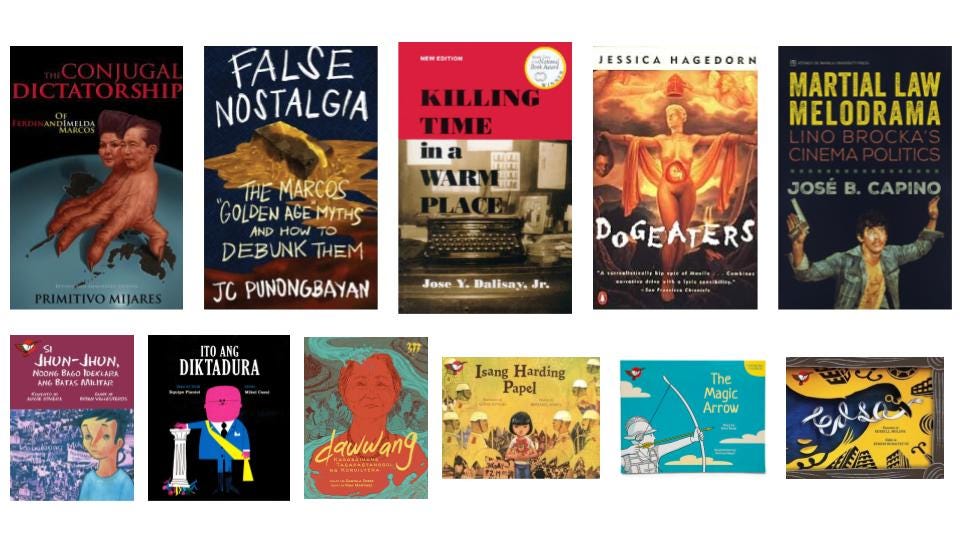Remembering Martial Law: Halina Filipiniana's reading list
Issue #10
[Author’s Note]
Hello fellow Filipiniana fans,
53 years ago, President Ferdinand Marcos Sr. officially announced the declaration of Martial Law. Although Proclamation No. 1081 was signed on 21st September 1972, the announcement was made on live television on the 23rd. He cited the communist threat posed by the then newly-formed Communist Party of the Philippines (CPP) and the rebellion of the Muslim Independence Movement. This event marked the beginning of a fourteen-year tyrannical regime that stifled dissent and led to large-scale human rights abuses.
Today, I wanted to share with you all our little compilation of books that are relevant to this dark period of our history. These titles are part of our humble Filipiniana library at home. There is plenty of written material on Martial Law. Jy and I want to collect as many as we can, so our future children and family/friends visiting our home can read them anytime. If you have other recommendations, please let me know so I can add them to the long list of titles deserving a space in our shelves.
It is our collective responsibility to remember that time and make sure that history does not repeat itself. Never again, never forget!
Halina!
-Roi
Martial Law reads from Halina Filipiniana’s humble library
The Conjugal Dictatorship of Ferdinand and Imelda Marcos by Primitivo Mijares
Instead of the synopsis, I wanted to share this post by Former Vice President, current Naga Mayor Leni Robredo about Primitivo Mijares’ disappearance and his son Boyet’s death:
“Boyet Mijares was the son of Primitivo Mijares, the president of the National Press Club during Marcos’ regime. Primitivo was a close confidant of Marcos, and served as the chief propagandist of the government. Boyet’s father was sent to the United States in 1974, and his disenchantment with the regime began there: Primitivo testified before the US Congress on the human rights violations occurring under Marcos’ rule, and he later wrote “The Conjugal Dictatorship,” a tell-all which exposed the lavish lifestyle the Marcoses lived.
“This sealed Primitivo’s fate. Little did he know that it would also seal that of his son’s.
“Boyet was 16 when he received a call form his father, who was lured back to the Philippines from the safety of the United States by Marcos’ men. One day, Boyet asked his mother if he could watch a movie with his friends in Ali Mall, and his mother strictly told him to wait for the car to bring him there. Instead, he asked their maid for 20 Pesos, and said to her, “I’m going to see my daddy today. So I will not wait for mommy. I will just use a bus in going to the place.”
“The next time they saw Boyet, he was dead. Boyet’s body was riddled with stab wounds, his skull bashed in. His genitals were mangled, and his eyes were protruding. Boyet’s mother, then judge of Manila, was able to obtain information that Primitivo was made to watch while men tortured his son. Primitivo has never been found.”
False Nostalgia: The Marcos "Golden Age" Myths and how to Debunk Them by JC Punongbayan
“This book is going to be perhaps the most lethal weapon in the arsenal against the so-far partially successful attempts (thanks to social media) to tout the 20-year Marcos era (January 1966 to February 1986) as a “golden age” in Philippine history. Specifically, JC Punongbayan relentlessly examines every one of 43 claims that have been made regarding that period—from the faintly ridiculous (that Imelda Marcos did not use public funds to build her “bopis” hospitals) to the utterly insane (that nobody was poor during the Marcos regime). And he debunks every one of them with a mountain of data and past studies, all footnoted, referenced, and acknowledged so anyone can check and see for themselves the accuracy of JC’s rebuttals. The joy of it is that he combines seven years of scholarly research with simple, clear, compelling writing. Bravo!” - Solita C. Monsod, Professor Emeritus, UP School of Economics
Killing Time in a Warm Place by Jose Dalisay
“A novel of growing up in the Philippines during the Marcos years. Told in the voice of its protagonist, Noel Ilustre Bulaong, the narrative travels through familiar social and literary territory: the coconut groves of Bulaong's childhood, Manila's hovels, the Diliman Commune, "UG" safehouse, martial law prisons, and the homes and offices of the petty-bourgeoisie. It is a story of false horizons, of betrayal, compromise, and guilt, and not incidentally of the contemporary middle-class Filipino's migration from the village to the metropolis to the outside world.” - Goodreads
Dogeaters by Jessica Hagedorn
“Jessica Hagedorn’s 1990 debut novel of overlapping narrators and interconnected lives. Set in the Philippines, it is a story of Manila, martial law, and Marcos—the book’s great unnamed dictator. In the ambiguity produced by fictionalization, the novel’s Marcos and First Lady Imelda become symbols of how one despot and his kin may be echoed by the next. With the president’s policies carried out by a “Special Squadron” that includes the ruthless General Nicasio Ledesma, the book captures the undercurrent of violence and death that permeates everyday life under military control. When horrors are daily, weekly, and unceasing, brutality, both in fiction and in fact, becomes almost quotidian.
“What else do you do in that camp of yours?” a morbidly fascinated lover asks the expert torturer Ledesma.
“Brutality is both a question and an answer.” - Alessandra Bergamin for California Book Club Newsletter
Martial Law Melodrama: Lino Brocka’s Cinema Politics by Jose B. Capino
“Lino Brocka (1939–1991) was one of Asia and the Global South’s most celebrated filmmakers. A versatile talent, he was at once a bankable director of genre movies, an internationally acclaimed auteur of social films, a pioneer of queer cinema, and an outspoken critic of Ferdinand Marcos’s autocratic regime. José B. Capino examines the figuration of politics in the Filipino director’s movies, illuminating their historical contexts, allegorical tropes, and social critiques. Combining eye-opening archival research with fresh interpretations of over fifteen of Brocka’s major and minor works, Martial Law Melodrama does more than reveal the breadth of Brocka’s political vision. It also offers a timely lesson about popular cinema’s vital role in the struggle for democracy." - Ateneo de Manila University Press
See our related posts on our socials (Instagram, TikTok).
Illustrated/Children’s books
Si Jhun-Jhun, Noong Bago Ideklara ang Batas Militar - story by Augie Rivera, illustration by Brian Vallesteros
“Jhun-jhun likes playing with his friends, but he would also like to know where his older brother goes. What is he going to learn about what is happening in the streets?” - Adarna House
The Magic Arrow - story by Bolet Banal, illustration by Korinne Banal
“The mighty king always says “NO—NO to books with colorful pictures, reading out loud, and singing and laughing in the streets. What happens when the island kingdom’s blacksmith decides it’s time for the king to change his mind?” - Adarna House
EDSA - story by Russell Molina, illustration by Sergio Bumatay III
“Different sights. Different experiences. What happened in the middle of EDSA? How did the people come together? Let us remember one of the most significant events in our history.” - Adarna House
Isang Harding Papel - story by Augie Rivera, illustration by Rommel Joson
“Jenny’s room is already filled with flowers, but her mother still isn’t home.
It’s the time of Martial Law when discipline is imposed as a requirement, they say, for progress. But for Jenny, it’s the time of separation from her mother.
Until when will she grow her paper garden?” - Adarna House
Ito ang Diktadura - story by Equipo Plantel, illustration by Mikel Casal
“This Filipino translation of a Spanish picture book by Equipo Plantel and illustrated by Mikel Casal, explains the concept of social injustice and dictatorship to young readers. The book is part of the Aklat ng Salin series translated from the Spanish Libros para Manana (Books for Tomorrow) first published by La Gaya Cienca in Barcelona in 1978.” - Artbooks.ph
Dawwang: Kababaihang Tagapagtanggol ng Kordilyera - story by Gantala Press, illustration by Nina Martinez
“Leticia “Tining” Bula-at is from the Naneng group of Kalinga province. In the ‘70s, the Chico River Dam project by President Ferdinand Marcos and the World Bank risked flooding the Naneng and other groups in Kordilyera. ‘Nay Tining was 28 years old when the National Power Corporation and the Philippine Constabulary arrived in their town to start the construction of the dam. ‘Nay Tining’s group resisted them — setting up barricades, dismantling the camps and directly facing against the soldiers. Despite the physical and psychological violence, the community’s protests continued, leading to the cancellation of the dam project. At present, ‘Nay Tining’s and other women’s fight for Kordilyera continues against corporations and the government whose projects risk the destruction of the Chico River and other neighboring areas.” - the author’s attempt at translating Gantala Press’ synopsis in Filipino
In partnership with Host Fria (IG, Tiktok)
Weddings, Corporate Events, Birthdays, kahit Gender Reveal Celebration pa yan, Host Fria can bring the most out of any event.
Host with the MOST!! Host Fria!
Author’s note: we’re grateful to Host Fria for partnering with us to deliver this newsletter to your inbox. With Christmas party season right around the corner, it might serve you well signing up an events host now. Please do check out his IG and TikTok pages if you are looking for a dynamic host for your events. Feel free to let him know you learned about him from Halina Filipiniana — he just might give you a discount ;)
PS: If you are interested in partnering with us / sponsoring our newsletters, please DM us in our socials (Instagram, TikTok, Threads and Facebook) or email us at roizyril@halinafilipiniana.com.




Check out Bamboo in the Wind by Azucena Grajo Uranza as well :)